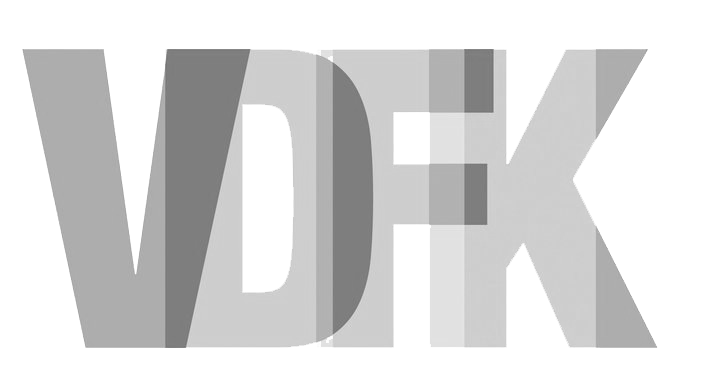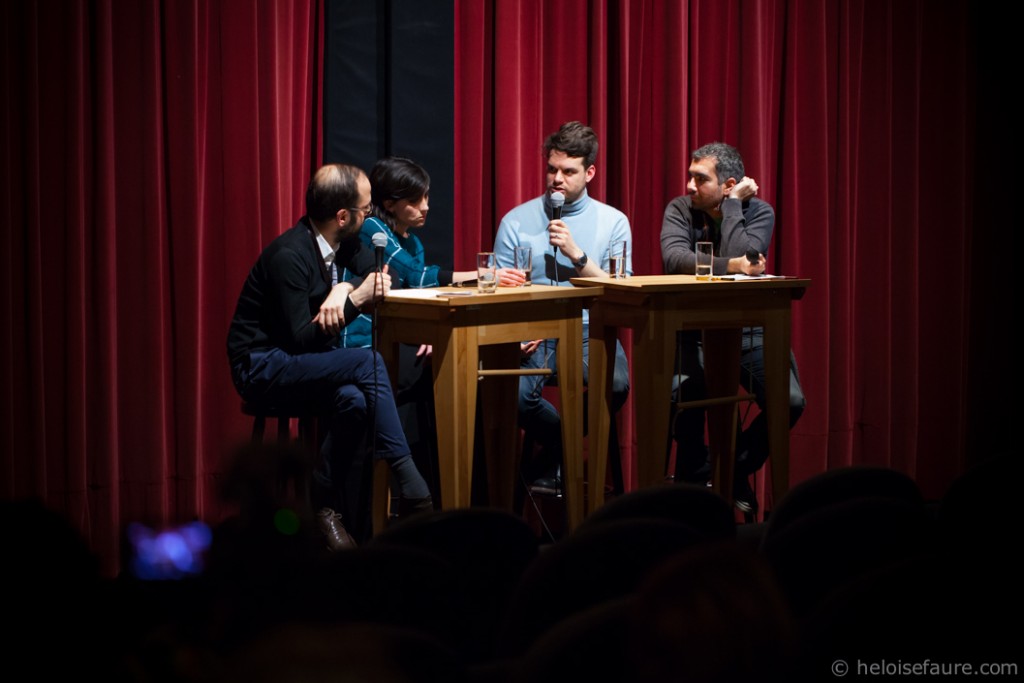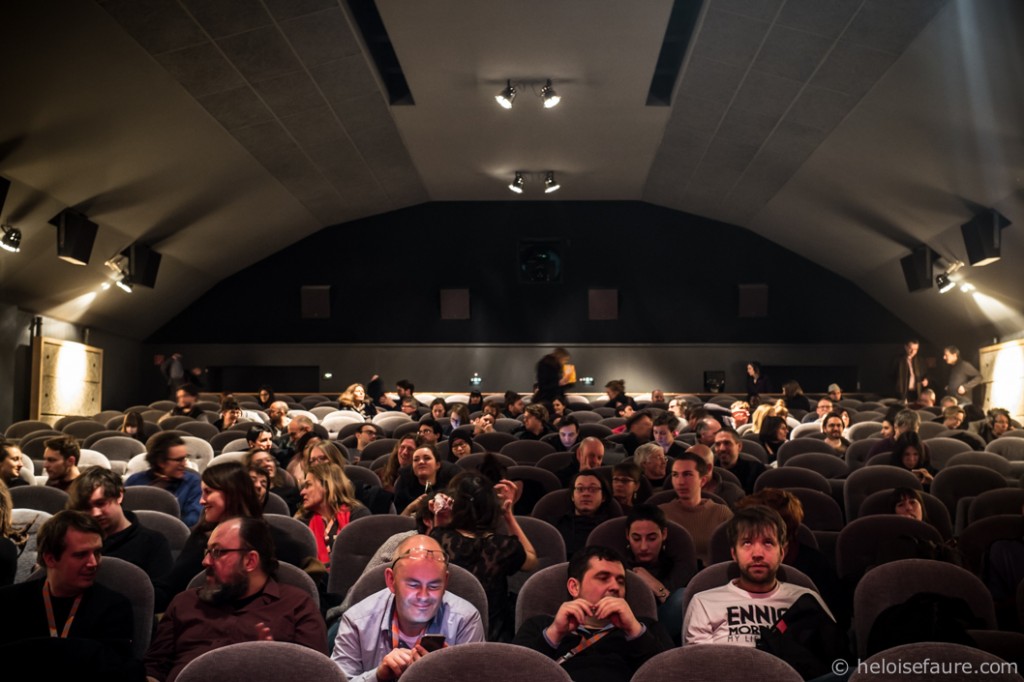Mixing is Listening #4 /16
Mixing is Listening: What was said at Berlin Critics’ Week 2016
Discussing cinema, its aesthetics and politics, is a very common and a very rare thing at once: We do it every day, and more often than not, we feel we’ve heard it all before. To cut through the slack and illuminate the resounding ideas that were raised at the second edition of Berlin Critics’ Week we opted to rearrange the vast material of the debates that followed our seven screenings. To look for patterns and stories arising from the seven nights. As contemporary music’s gift may have been to acknowledge mixing as an artform, we give you a mix/collage of our discussions, in the hopes for it to be more than the sum of its parts.
Killing Big Shots
Fadi Abdelnour: Reaching an audience also depends on curators and mass media. Every decision in that area effects filmmakers and artists in the whole world. Why do you choose to show a film in Berlin and why not to? That is a big question.
Joseph Fahim: And isn’t that what festivals expect or want? Or demand?
Jay Weissberg: Absolutely, they demand it. They are looking for films that they think have a particular message. They are not going to program comedies. Or almost never.
Joseph Fahim: Or genre movies.
Jay Weissberg: I think more and more festivals are actually looking at various genres. I have an issue with the whole concept of genre, because I think every film is a genre. It’s a strange category for me. But a problem with the festival landscape in general is that people don’t realize that we need diversity in our films. That we can love Coma and we can also like Bridesmaids.
Heba Amin: I really do wonder: Is it the responsibility of festivals to pick a film from each region and then show this diversity? And what pressure does that put on artists to create these very specific kinds of films and to fit a specific mold?
Jay Weissberg: It is a subject that interests me particularly, especially with regard to the MENA region [Middle East / North Africa]. Because too long festivals have thought: Well, I have one Arab language film in my program, and that is okay; I have dealt with the region. You can have five films from Latin America, or six, or more. You have one Arab film and you think, halas, it is done. Why are we limiting any region to one particular voice? Which indeed does force the filmmaker to think: I have to therefore represent 400 million people.
Joseph Fahim: Out of curiosity: What do you think caused the sudden interest in Arab movies?
Jay Weissberg: Now? The refugee crisis.
Joseph Fahim: Good point.
Jay Weissberg: Everybody wants to be able to hang their coat on a particular hook. And that is the one now. Unfortunately, because everything is fashion.
Jay Weissberg: We need to make the idea of making cinema more of a possibility for everyone. In this digital age it is much more accessible, it is much easier for people to pick up a camera. […] I hope this doesn’t sound sort of “Western Charity Organization” thing: I would love to have cameras distributed in refugee camps. There are so many stories that need to be told and that people can be inspired to tell and to show. That would be a really good idea.
Frédéric Jaeger: Tatsächlich sind Flüchtlinge im Film [Orientierungslosigkeit ist kein Verbrechen] nur aus der Ferne zu sehen. War das ein Teil des Konzepts? Wie hat sich diese Entscheidung für euch ergeben?
Tatjana Turanskyj: Das Ganze ist eine Reise an die Ränder Europas, das ist das Thema des Films. Als wir das konzipiert haben, ging es vielmehr darum, die Grenze abzubilden, beziehungsweise das unsichtbare Grenzregime zu zeigen, was man 2012, 2013, 2014 vielleicht gespürt hat, weil sehr viel Militär da ist, aber nicht gesehen hat. […] Da hat sich das mediale Bewusstsein komplett verändert bezüglich der Bilder. Und dann haben wir uns gesagt, wir machen einen Film über zwei Frauen, die sich treffen, und aus unserer Perspektive, aus dem weißen Mittelstand kommend, darüber sprechen.
[…] Es ging also vielmehr darum: Wie gehen wir damit um? Was ist unsere Sichtweise? Die hat sich jetzt natürlich noch mal verändert. […] Das war der Stand der Dinge zu diesem Zeitpunkt. […]
Dennis Vetter: Es ist natürlich Zeit vergangen, aber der Film gilt noch für euch? Das ist keine Distanzierung, die ihr hier vornehmt?
Marita Neher: Inwiefern sollten wir uns davon distanzieren?
Dennis Vetter: Das ist die Frage. Das ist keine Empfindung, die ihr habt? Ihr seht die Zeit, die vergangen ist, nicht als etwas, dass euch von dem Film entfremdet?
Marita Neher: Für mich ist wichtig an dem Film, dass die zwei Frauen ihre eigene Position reflektieren. Dass man den Blick umdreht. Wir schauen auf die Flüchtlinge, haben hier viele Bilder von Flüchtlingen gesehen. Es sind immer dieselben Bilder, die erschütternd sind, klar. Aber letztendlich müssen wir eine Position dazu finden. Zu den Menschen, die herkommen und Hilfe suchen. Und die zwei Frauen verhandeln ihre eigenen Themen vor diesem Hintergrund. Das war uns wichtig, und davon muss ich mich überhaupt nicht distanzieren.
Heba Amin: I wouldn’t limit films like this [Coma etc.] by saying that they only reach a white Western middle class. Because people are transforming the ways that they digest images. Especially, when we start talking about the digital age and access to material online. I think people’s perspectives of these kinds of works are starting to change. People’s tastes in these kinds of works are starting to change. And it may not reach a mass audience, but it might reach someone. And, ultimately, as a creative person, that is what you hope to achieve.
Jay Weissberg: Do we need to talk down to an audience in order to make it accessible? My argument is that we do this in every country. It is not necessarily limited to the Arab world. The majority of American films are geared towards a – I don’t want to say: dumb public. But for a public who aren’t looking at cinema as anything other than entertainment. […] And I’m not sure that there is a problem with adapting yourself when there is a message that you want to get out to a wider audience.
Fadi Abdelnour: Everybody speaks about awareness but sometimes awareness is not more than pressing a like button on Facebook. It depends on how much the people want to react […] We should definitely make sure that such films and such contexts don’t become pure entertainment and only consumption for intellectuality.
Heba Amin: It is a really big topic right now. I can’t tell you the number of events that I’m being invited to on Human Rights and art – “Can Art save the world?” […] There is a place for art and film to move people, to address important topics, to start that discussion. […] But then again it’s like putting that entire load and responsibility on this field or this genre to get us out of the mess that we are in.
Candice Breitz: Personally I am quite interested in what I call lowest common denominator culture. I am interested in the fact that when I reference or dive into – let’s call it mainstream culture, because it is not always Hollywood. It carries with it a number of association and experiences and memories that are not exclusive. Through those references I am not speaking only to people who went to art school and who know who Pasolini is and who Godard is. I value all of that culture, which is less broadly accessible, but personally I am interested in this lowest common denominator – and in whether there is something to be gleaned out of it, or extracted from it, that moves beyond the assumptions that we usually make about this culture. It is throwaway culture, it is highly commodified culture; culture which is marketed in a very specific way to produce capital. And yet despite all of these obvious shortcomings, I think it paints a much broader picture of the mainstream popular imagination. It gives one access to desires as they exist but also as they are produced, in a way which is not available from less broadly known film.
Lewis Klahr: I’m being very excited about time periods where there is some kind of transition going on. Actually in a lot of artworks, too, where there is part of something that is very visible and what is coming next is starting to come in. Then there is a kind of awkward mixture, the new is not completely integrated yet. Things are in juxtaposition. Maybe that is why I like collage so much. Because collage is so much about juxtaposing things that don’t necessarily go together and then they become different through that juxtaposition.
Mirjam Schaub: Sehr geärgert [an 88:88] hat mich als Philosophin natürlich, dass immer wieder mal solche Philosophenschnipsel zu sehen waren und dass man sehr penetrant auf Alain Badiou hingewiesen wurde. […]
Deshalb war ich sehr dankbar über eure Verwurstungsszene am Anfang [von Orientierungslosigkeit ist kein Verbrechen], weil mir sofort klar wurde, was mich eigentlich störte an dieser total oberflächlichen, nur den Hype von Badiou mitnehmenden Verarbeitung. Da redet er über Zeit, über Ereignisse, über Liebe, der ist ein Aktivist… 20, 30 Jahre hat den niemand zur Kenntnis genommen. Dann war Deleuze tot, vorher war noch Lacan tot und Barthes war tot. Und als sie alle tot waren, dann konnte er als der letzte Totengräber auftreten.
• • •
Redaktion: Raphael Flechtner, Frédéric Jaeger, Maximilan Speck, Lisa Weber, Irene Wildberger.
Find the full discussions on our Youtube channel!






